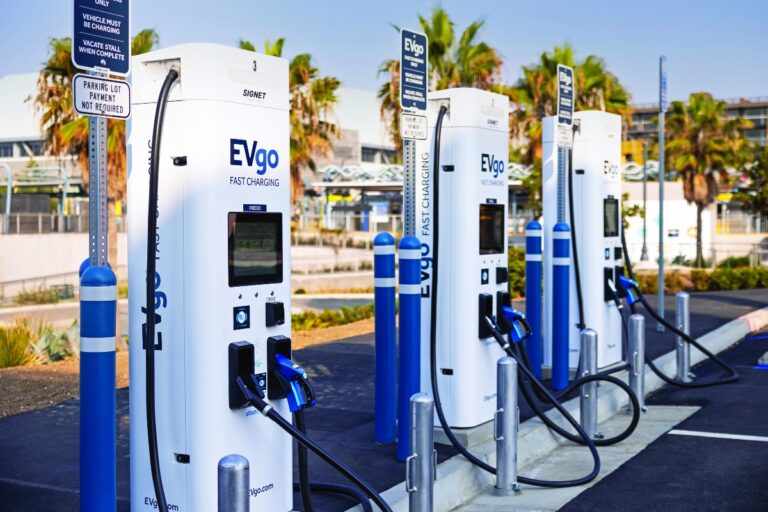
With sales of electric vehicles growing, EVgo Inc. would seem to be poised for growth as well.
However, the share price of the West L.A.-based electric vehicle charging station and infrastructure company has dropped considerably in the past year.
For the 52-week period ending April 13, EVgo shares decreased by more than 50%, from a closing price of $13.02 to $6.24 on Thursday.
In a conference call with analysts on March 30 to discuss fourth quarter and full year earnings, the only mention of EVgo shares was by Olga Shevorenkova, the company’s chief financial officer.
Shevorenkova said that the company had raised $10.4 million by issuing 1.6 million shares of Class A common stock through an at-the-market equity offering in the fourth quarter.
The company reported on March 30 a net loss of $4.4 million (-6 cents a share) for the quarter ending Dec. 31, compared with a net loss of $12 million (-18 cents a share) in the same period of the previous year. Revenue, however, increased by 283% from the first quarter of the prior year to $27.3 million.
Shevorenkova attributed the revenue increase to greater retail charging revenue and continuous execution of its EVgo eXtend contract with Pilot Flying J in partnership with General Motors Co.
In July, the company announced a collaboration with Pilot Travel Centers LLC in Knoxville, Tennessee, and GM, in Detroit, to deploy up to 2,000 charging stations at about 500 Pilot Flying J travel centers across the United States. Through its eXtend program, EVgo provides the hardware, design, and construction of charging sites, as well as ongoing operations, maintenance and networking and software integration solutions, while its customers purchase and retain ownership of the charging assets.
Cathy Zoi, chief executive of EVgo, said that the future stations were well aligned with the priorities of the Biden Administration’s National Electric Vehicle Initiative that will deploy $5 billion to build out a nationwide charging network, starting with interstate corridor sites.
“With 78% of the continental U.S. interstate system within 10 miles of a Pilot Flying J, we see incredible potential for this project,” Zoi said during the conference call.
Craig Irwin, an analyst with Roth Capital Partners LLC in Newport Beach, wrote in a research report that the eXtend program helped drive revenue during the quarter.
“Management expects continued progress in 2023, but noted supply constraints, as the main suppliers Delta (Electronics Inc.) and (SK) Signet are moving manufacturing to the U.S., and have pushed some 2023 deliveries out to 2024,” Irwin said in the report.
Delta, based in Taiwan, and SK Signet, the electric vehicle charging company of SK Group, in Seoul, South Korea, are both building new factories in Plano, Texas.
Both companies are aiming at going online with the new factories in the later part of the year, Zoi said.
“And once they go online, we need to obviously test the equipment that comes out because for us, safety and reliability is of utmost importance,” Zoi said. “So, we like we’re hopeful (by the) end of this year that we’ll be able to sort of get access to those U.S. manufactured 350-kilowatt chargers and get them moving.”
The high-power 350-kilowatt chargers will be deployed to low income and disadvantaged communities under a $6.6 millon contract EVgo received on April 4 from the California Energy Commission’s California Electric Vehicle Infrastructure Project 2.0 program, according to a release from the company.
The funding is designed to aid the deployment of fast charging infrastructure in the central and eastern regions of the state through the Golden State Priority Project, which provides rebates for the installation of DC fast chargers capable of at least 150kW, the release said.
